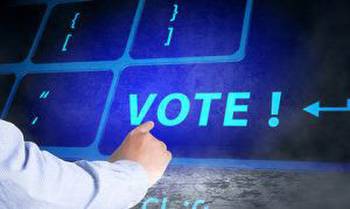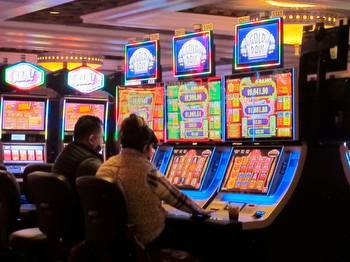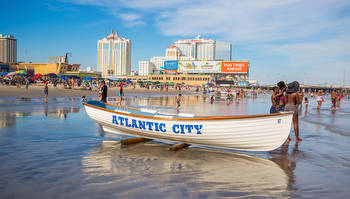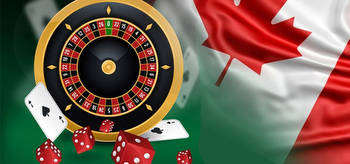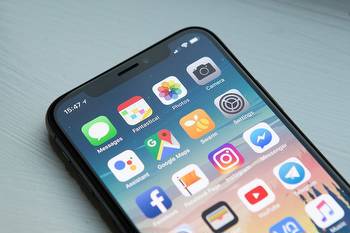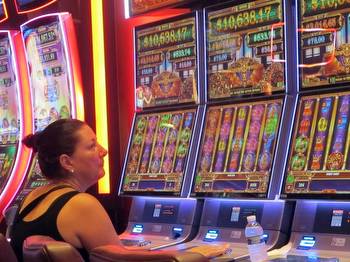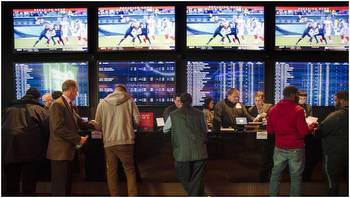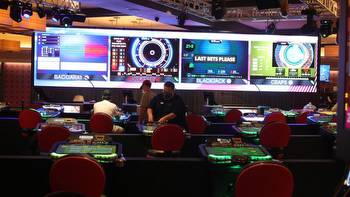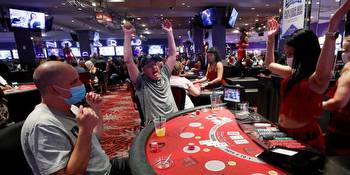US online gambling: Seize the pay day


Gambling Insider speaks with Ocean Casino Resort CEO Terry Glebocki and AGS CEO David Lopez about how timing is everything when it comes to opportunity and risk, especially when online and land-based demand battle for market share.
If it’s too good to be true, the saying goes, it probably is. Online gaming has surged in the last few months amidst the coronavirus, leaving some in the industry to wonder whether online products can provide long-term cash flow or if digital games will fizzle out once brick-and-mortars return to pre-pandemic levels. The debate generates divergent viewpoints with plenty of overlap in between.
Almost all major US casino operators have enhanced their online gaming portfolios this summer, giving a boost to many manufacturers and suppliers. Just how much operators are willing to invest in online depends on how confident they are that customers will flock back to land-based casinos until avaccine is ready.
Predictably, online revenue shot up this summer in states with legalised mobile sports betting or online poker and casino games. In May, when casinos were shut down across the country, New Jersey gambling sites recorded a then-record $86m. As Garden State casinos remained closed for the month of June, revenue stayed steady at $85m.
Then came a bit of shocker. After New Jersey casinos reopened in early July, it was reasonable to expect online revenue to drop a bit. Instead, July produced a record $88m for gambling sites, suggesting that online can thrive even with brick-and-mortars returning.
“Online has certainly taken off in New Jersey,” Ocean Casino Resort CEO Terry Glebocki tells Gambling Insider.“We didsee a pick up when it was first shut down. But we were actuallysurprised to see more people playing after we reopened than we didwhen we were closed.”
Pennsylvania has seen a similar story play out. In May, the state reported record online revenue of $56m, followed by $50m in June and $54m in July. For the month of July, slots accounted for 72% of all the state’s online revenue. The $39m in slot win amounted to a year-on-year increase of more than 7,500%.
The recent success of online has helped turn traditionalists into believers and has vindicated those who were early to the party. American Gaming Systems, a Las Vegas-based developer, manufacturer and supplier, aggressively sought online products before the coronavirus. At the time, PlayAGS CEO David Lopez felt plenty of pressure from investors.
“When we made our investment in online, it brought much criticism because we were burning EBITDA for a while,” says Lopez.“I certainly didn’tpredict a pandemic but I always said, at some point, onlinewill just be huge. And we’re not even to the huge part. Online sportsand online wagering, like real money gaming, will just keep growing.”
These days, Lopez is grateful that he and his company possessed the foresight that online would eventually take off. Though PlayAGS stock is a fraction of what it was before the pandemic, it has risen more than three points since the casino shutdowns of mid-March.
“I had to tell investors, although you see a negativeEBITDA impact on the organisation, the day will come that if wehadn’t made this commitment, our investors and stakeholders wouldlook at us and say that bus kept coming by. You kept sitting at thebus stop and it kept driving by – every time it stopped you didn’t geton. Why would you not participate in the online space? Clearly,we’re big believers in the online space.”
Online and mobile products that were previously dismissed by the industry are suddenly receiving a second look. ZenSports, a San Francisco-based peer-to-peer mobile sportsbook, built up an international consumer base as US operators initially shrugged them off. Then this April, the company struck a partnership with Strategic Gaming Management for Nevada market access. ZenSports will acquire Big Wheel Casino in Lovelock, Nevada, as part of the requisite to launch a mobile product in the state. Though the company will brand Big Wheel and Baldini’s Sports Casino in Reno, its product is exclusively mobile.
“We’re very bullish that people will go to in-person places again,” ZenSports CEO Mark Thomas says. “If you take it a step further and think about the beauty of our product being mobile only, yes, you have to come in person to register at the casino sportsbook, but once you do that you’re home free on the mobile side. So our product lends itself perfectly to a post-Covid world where someone doesn’t want to go in person.”
In Nevada, however, there is already a proven demand that people do want to bet again in person. McCarran Airport in Las Vegas reported 1.6m arriving visitors for the month of July, up 56% from June. Highway travel, meanwhile, nearly returned to normal levels by reaching 90% of July 2019 traffic. Though Las Vegas visitation was down more than 60% from a year ago, thanks in part to no conventions, regional demand is on the rise.
Onlinesports betting could potentially get to the point where it dwarfs land-based sports betting. I think for real money casino gaming, though, notlikely in my lifetime will online exceed land-based – but that doesn’tmean that I’m rightDavid Lopez
Those California travelers aren’t heading to Las Vegas to wager on their iPhone. They want to be back on a casino floor or watching games from a sports book. The novelty and unpredictability of entering a casino is something that can’t be replicated on online sites.
“The majority of times you go to acasino, you’re going to eat, have drinks with friends, hang out, havefun,” Lopez says.“You go for your own entertainment, for your own fashion – thisis what casinos have become. The point of that is to go to have funand enjoy yourself – and that includes those who are not evenmaking a bet. That’s what the experiential end of it is what the onlinespace is missing.”
For casinos that have embraced online in recent months, they must weigh the risk of making potentially long-term decisions using limited data. Since most states with legalised online gaming launched sometime in the last year, there’s no historical precedent to turn to.
Independent casinos are also up against a swarm of competition. Online gaming is far from egalitarian; established brands possess the upper hand and the gap seems to be widening.
Golden Nugget accounted for $31m of New Jersey’s July online revenue, while Atlantic City-based Resorts International used its home field advantage for a $18m share.
In Pennsylvania, Penn National’s Hollywood and DraftKings brands placed second in July, trailing only Rivers Philly (SugarHouse and BetRivers). And Valley Forge’s online partnership with FanDuel helped the casino to a third place finish.
“Our online presence is very small,” Glebocki says.“When I gothere, there was so much to do, I thought it was best to focus on thebrick-and-mortar. This year, we started looking at the online gamingside. We had over 200% growth year-on-year in July, but it’s off sucha small base. We only did $1.2m in online gaming win and theindustry was $87.5m, so lots of opportunity for growth there.”
Smaller operators with tighter budgets will naturally have a tougher time building up their online presence and marketing their sites to consumers. Those operators must balance the potential reward of greater online win versus doubling down on their brick and mortar locations for when the coronavirus does inevitably end.
Land-based casinos have the strongest advantage when it comes to attracting bettors who prefer slots, card and table games. One reason for this is that players tend to have less trust in the outcomes of online variations of the same game. This is divergent from sports betting, where mobile wagering is often the preferred route.
When Gambling Insider asked Lopez if there will be a time when online gaming holistically challenges land-based, he shook off that notion. “Not in a few years. I think where you might see a challenge is onlinesports betting could potentially get to the point where it dwarfsland-based sports betting. I think for real money casino gaming, though, notlikely in my lifetime will online exceed land-based – but that doesn’tmean that I’m right!”
In July, New Jersey mobile sports betting apps outpaced brick and mortar by a 9-1 margin, but that doesn’t mean that trend is here to stay. No local sports teams were competing that month (unless you count the New York Mets), and special events tend to bring more bettors into physical sports books than daily basketball or baseball games.
The fall months will give a better idea if brick and mortars in football-enthused states like Pennsylvania, Michigan or Indiana can attract huge numbers, or if sports bettors will ride out the coronavirus in their living rooms.
Sports books are at their zenith during March Madness, but the coronavirus scratched out any of those plans for 2020. Assuming the pandemic has subsided by next spring, those early weeks of March 2021 will be the best litmus test of whether online sports betting sites have truly pulled of brick and mortar or if American sports fans are willing to head back into casinos en masse.
The longer the pandemic lasts, the better it looks for operators who made the decision this spring to ramp up online offerings. The lucky operators who partnered with DraftKings before or during the pandemic must be feeling especially good right now given DK’s success at expanding its online portfolio.
However, as the country heads into the tail end of 2020, operators must be careful not to get overly zealous for online gaming. The worst mistake would be to invest heavily in online in September or October, only to see a vaccine appear by this winter that sends Americans storming back into casinos. Operators who missed out on the summer-time online windfall may be kicking themselves, but as baseball coaches will say, don’t let one error turn into two.
Brick and mortars hold staying power that online sites can’t compete with and most of it comes through the inherently social nature of casinos: bettors won’t develop loyalty with a desktop the way they do with person-to-person interactions. Though online social casinos are growing in popularity, they don’t offer the spontaneity of winning a slot to the sound of sirens or the joy of cashing in a stack of chips.
America’s premier gaming and entertainment hubs, Las Vegas and Atlantic City, are especially hard to replicate. When the pandemic is over, expect those places to reap the greatest benefits over online play.
Gaming has always been about a lot more than gaming. Online will continue to play a vital function in the coming years as more states legalise digital casinos and sports betting. However, just because a new avenue is available doesn’t mean it should be the preferred way of movement.
“People won’t hang out on Zoom after the pandemicis over, having drinks over virtual calls,” Lopez says. “People want to hang out,laugh together, tell jokes and stories. I think that’ll be the hang-upand the hold-up for online to exceed land-based.”
Although approximately $4.3bn will be bet on Super Bowl LV this Sunday, fewer Americans will place a wager, according to research by the American Gaming Association (AGA).The gaming trade body estimates...
Slot Focus
Slot Focus
Slot Focus
Every CEO we’ve spoken to has had their own unique journey. Matt Davey tells us in this edition about starting out with a gambling regulator, while MGM Resorts International CEO Bill...








